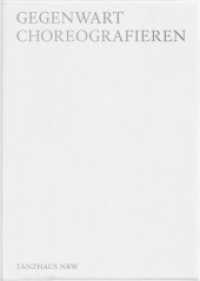- ホーム
- > 洋書
- > 英文書
- > Business / Economics
Full Description
In 2025 the shift from an industrial to a knowledge economy is underway. The shift has introduced changes in our essential economic assumptions and models in how markets behave and the nature and sources of capital. The shift is affecting the way we do business and the ways we manage our organizations and operations. Over the past two hundred years, we have developed and perfected methods and tactics to help us analyze and cope with the economic environment. These established methods and tactics are no longer sufficient. The knowledge economy requires a new foundation of knowledge capital. To be strategic and intelligent the old analytical methods just adapt, and new methods are needed.
The latest volume of Working Methods for Knowledge Management speaks to doing intelligence in the dynamic, chaotic and continuously changing environment of the 21st century. It is predicated on the understanding that every intelligence situation or dilemma is unique. It is predicated on the rapidly evolving shift in management and the changing nature and structures of organizations. The authors consider the changing nature of markets, economic transactions, and competition in the knowledge economy. What can we learn from exploring the new economic environment to design a new approach to strategic intelligence?
The authors make a case for strategic intelligence grounded in knowledge capital assets and present a conceptual model and framework for managers and practitioners to consider in designing a new approach. The conceptual model considers eight critical factors when designing a new approach with the text providing in-depth explanation of these factors. By adapting the existing tools and developing new tools to transform this critical practice for the knowledge economy, strategic intelligence offers an indispensable guide for anyone working in the knowledge and business management spaces.
Contents
Section 1. Making the Case for the New Strategic Intelligence
Chapter 1. Strategic Intelligence in Transition
Chapter 2. The New Strategic Intelligence
Chapter 3. Getting to There from Here
Section 2. Knowledge and the New Strategic Intelligence Process
Chapter 4. Intelligence Situations and Dilemmas
Chapter 5. Building Scenarios to Understand the Future
Chapter 6. The Environment: Scanning, Surveilling and Sensing
Chapter 7. Situational Awareness: Knowing What to Look for
Chapter 8. Actors and Roles in an Intelligence Situation
Chapter 9. Actionable Knowledge for a Situation
Chapter 10. Assessing the Consequences and Effects of Intelligence Decisions
Chapter 11. Strategically Intelligent Decision and Choices
Section 3. Building Strategic Intelligence Capacity for a Knowledge Economy
Chapter 12. Building Strategic Intelligence Capacity, Capabilities and Competencies
Chapter 13. Strategic Intelligence and Knowledge Ethics
Chapter 14. The Shifting Landscape of Actors
Chapter 15. Strategic Intelligence Diagnostics and Preparedness






